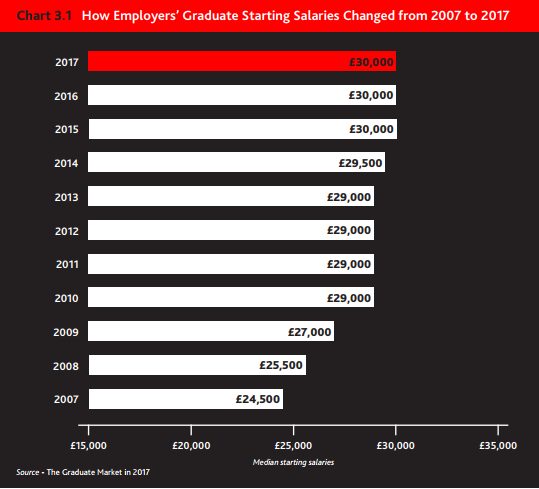
Our Recruitment and Talent Development Manager, Sophie Finlay, shares her thoughts on what graduates can expect to be earning in their first graduate role.
One of the most important factors that graduates consider when looking for graduate jobs is money. In your first role especially, it’s difficult to know how much you’re really worth.
What the stats say
The leading voice on graduate salary statistics in the UK seems to be the High Fliers report. This report is an annual review of graduate vacancies and starting salaries at Britain’s leading employers. According to their 2017 report, the median graduate starting salary is £30,000, the same level it has been since 2015.
We can see that the higher tuition fees haven’t been compensated by higher salaries.
 The real average
The real average
While I’d love to tell you that every graduate can expect to be taking home around £30,000 in their first year at work, this is unrealistic.
Graduatejobs.com estimate that graduates are more likely looking at a starting salary of £19,000-£22,000 and I think this is a much more reasonable figure.
Unrealistic salary expectations are ruining graduates’ chances
Unfortunately, figures like those batted around by High Fliers are giving many graduates unrealistically high salary expectations.
The main problem with this is that when potential employers are asking graduates about their salary expectations, they are pricing themselves out of roles and indicating to employers that they lack commercial awareness. Plus, the grad ends up feeling disappointed if they are offered a salary which they feel is below average.
Influencing factors
What graduates need to bear in mind is that there are numerous factors which will have an impact on their salary after they graduate. These include:
If you’re looking for a role in London, you can expect a higher salary than a similar graduate role in Manchester. If you’re heading into the finance sector, your salary will likely be higher than a graduate entering into the media industry. Likewise, graduates who have completed more niche degrees, such as medicine and dentistry, are entering into jobs with higher salaries.
How to set your salary expectations
There are online tools, such as PayScale and ValueMyCV, that will help to give you an idea of what starting salary you may be offered. Another great way to gauge the going rate for graduates in your sector is to look at the roles advertised online and the types of salaries available there.
If you’re offered a graduate salary that is lower than what your research suggests you should be on, don’t be afraid to negotiate (but at the same time do bear in mind how competitive the graduate job market is). Do also take into consideration any bonuses and additional benefits that the company is offering you.
Your first graduate role may have a lower starting salary than you’d hoped, but if there’s plenty of scope for progression and salary increases then it’ll be worth it. Don’t just settle for a job that pays more now if you will still be stuck on that wage in 5 years’ time.
Bringing it all together
You’ve worked hard and uni and earnt a degree, of course you want to see the payoff now. However, it’s important to always be realistic with your salary expectations and to remember that this is just the start. If you prove yourself and make an impact at the company, you’ll soon see your salary rocketing.
Follow us on Twitter, LinkedIn and Facebook for business insights, interview tips, advice and career opportunities.